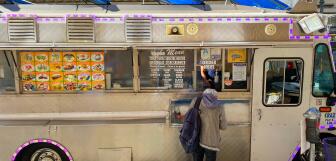What Licenses Do You Need to Start a Food Truck?
As with any business, you need to take the proper legal steps before you can start serving customers. From taxes to food safety, there are several tasks to complete before you can call your food truck official.
So, what licenses do you need to start a food truck? Let’s go over the essentials.
While each state’s requirements are different, most food trucks will need to satisfy these requirements.
Business licenses and requirements
As the business owner, you should complete the following tasks to prevent any legal issues.
Employer Identification Number (EIN)
You will need an EIN to pay taxes to the Internal Revenue Service. Luckily, the IRS website makes it easy to register for an EIN.
Once you have an EIN, you can create a business bank account and start building credit in your company’s name. Even if you will be a solo operator, it is best to use an EIN instead of your social security number so you can keep track of taxes separately.
Business license
Your state and city likely require you to register your business with local authorities. This license allows the city to monitor your food truck and ensures you pay the correct taxes and fees.
Some licenses are specific to certain industries, so be sure to review all permits to ensure full compliance.
Seller’s permit
Where will you get your supplies and food inventory? With a seller’s permit, you can avoid paying taxes when shopping from wholesalers.
However, these permits are not available in all locations.
Vehicle license
Food trucks give you endless customisation options, but you need to be sure your vehicle is legal before hitting the streets. Not only will you need to register your truck, but you may also need to undergo an inspection to ensure it is safe.
In some rare situations, your truck will be considered a commercial vehicle. If so, operators will need a commercial driver’s license.
Mobile food vendor permit
Some states require you to register as a mobile food vendor. In Florida for example, this permit includes everything from food trucks to non-motorised carts. These permits can be regulated by several offices, such as the Department of Health or Department of Business and Professional Regulation.
Health Department permit
Any business that prepares and serves food will need to meet safety standards set by the government. Registering your food truck with the Health Department shows customers that you follow all precautions and keeps your business legal. After registering, the Health Department will need to inspect your food truck and observe your handling practices.
Food truck commissary permit
Many cities and states require you to register with a commissary. These are essentially commercial kitchens where you can prepare and store food before serving it on your truck. Commissaries also give you a place to park your truck, use the restroom, and organise supplies.
Governments often require businesses to use commissaries because they meet safety standards. Home kitchens can be unsanitary, and using a commercial kitchen ensure that employees are in a safe, regulated work environment.
Parking permit
Parking permits regulate where you can park and for how long. Unless you are parking on private property, you will need this document.
Food trucks are big, so nobody wants them impeding traffic or creating eyesores in residential areas. Likewise, cities want to ensure fair competition and may not want a taco truck to park directly outside of a Mexican restaurant.
Business formation
While this isn’t necessarily a license, you will want to incorporate your business. Forming an LLC or other business entity will help shield you from liability and separate your finances.
Individual licenses and requirements
Your employees will likely need the following to work legally.
Food handlers permit
Many states require all employees to take a course on proper food handling. The course is usually quite basic but is mandatory to ensure your staff understand the government’s expectations. In some states, this course is online.
Driver’s license
If you want staff members to drive your food truck, they will need a driver’s license. As we stated above, a regular license should do, but there are rare situations that warrant a CDL.
Employment documents
To legally employ someone, you will need them to complete several IRS forms, such as Form W4. They will also need to complete Form I-9 to document their identity and work eligibility.
Epos Now - Your secret to a successful food truck
If you’re opening a food truck or other hospitality business, you will need a powerful fleet of tools to keep things organised. From managing your supplies to accepting payments, there are many tasks to complete each day.
Epos Now creates point of sale systems that handle all these jobs for you, making your day much easier. With desktop, tablet, and mobile systems, we offer flexible options that suit any business model.
With an Epos Now POS, you can:
- Manage inventory: Track all ingredients, packaging, and other supplies directly from your terminal. All sales automatically update your inventory, letting you see your stock levels in real-time.
- Process payments: Accept cash, card, and contactless payment thanks to our integrated processing partners.
- Collect online orders: With Epos Now Order & Pay, customers can order online and schedule a pickup time.
- Leverage the cloud: Our systems store data on remote servers, so you can manage your trucks remotely with any device.
Contact Epos Now today to start your food truck on the right foot!



